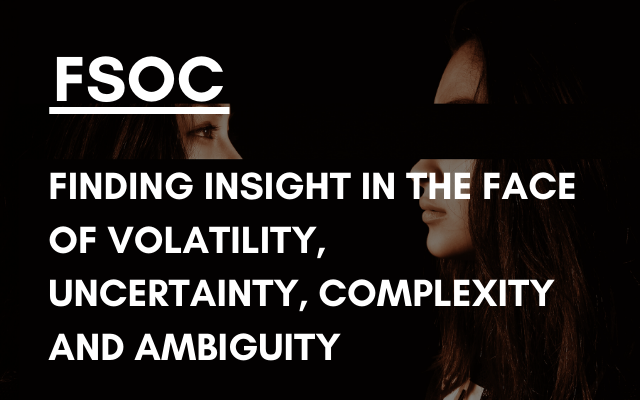FSOC – Finding insight in the face of volatility, uncertainty, complexity and ambiguity
Released on March 20th, 2020
Former British Prime Minister Harold Wilson famously said, “A week is a long time in politics.” He was referring to how much a volatile domain can change in a very short period of time.
Politics aside, the last few weeks have brought more volatility and uncertainty than most of us have seen in our lifetimes. We’ve heard about exponential growth in relation to the coronavirus and seen the stock market experience unprecedented losses. As I write this, the current British PM, Boris Johnson has just announced that all bars, restaurants and gyms in the UK are to be closed from tonight.
But something else showed up today. Today’s ‘daily doodle’ on the Google homepage was of one of my heroes, Ignaz Semmelweis. In 1843, Semmelweis had an insight into the nature of germs; an insight that resulted in a 30-year increase in the average lifespan of every person on the planet. Seeing through this misunderstanding about how life already works has had a bigger effect on physical wellbeing than all medical interventions combined.
So in honour of Semmelweis, I thought I’d share this excerpt from my book RESULTS: Think Less, Achieve More (©2016 Jamie Smart, published by John Wiley & Sons Ltd).
It’s about finding insight in the face of volatility, uncertainty, complexity and ambiguity.
We are now living in a VUCA world
As digital technology continues developing at an exponential rate, our world is changing accordingly. The acronym VUCA was coined by the US Army War College to describe the kinds of scenarios the military have been finding themselves in since the 1990s. The term has been adopted more recently by businesses and futurists because we all now live in a VUCA world: a domain of volatility, uncertainty, complexity and ambiguity.
Alfred Korzybski (creator of general semantics) served as an intelligence officer during the First World War. He realized that while the technology of war was progressing at an astonishing rate, the social structures, organizations and habits of thinking that gave rise to the war were not progressing. In the 100 years since Korzybski’s insight, technology has progressed at a dizzying rate. Today we have computers, drones, smartphones, nanotechnology, hydrogen bombs, artificial intelligence, life support machines, virtual reality and more. Our technology is accelerating exponentially, but our societal understanding of thinking and perception is still stuck in the Middle Ages.
At our current level of consciousness,
entrusting humanity with exponential technology
is like giving a toddler a loaded machine gun.
We need a new understanding of how our minds work
to navigate the challenges of volatility, uncertainty,
complexity and ambiguity.
DISTINCTION: Linear thinking vs exponential insight
If you were to place one grain of rice on the first square of a chessboard, two on the second, four on the third and so on, doubling every time, something surprising would happen. By the time you get to the 64th square, you would need hundreds of billions of grains of rice. This surprises us, because we’ve been conditioned to think in terms of linear increments rather than exponential jumps. But digital technology has no such limitation. Computing power grows exponentially: it doubles in speed and halves in size and cost roughly every 18 months (a function known as Moore’s Law). Our intellects have evolved for the linear world we’ve lived in for most of human history. But digital technology is driving us at high speed into a VUCA world that requires a new, more leveraged way of thinking.
While linear thinking can be useful, it has an inherent limitation: its only reference point is the past; the thoughts you’ve already had. All too often, we approach strategy, goal setting and problem solving by identifying problems and solutions from our current level of consciousness, then setting out to solve them from the same perspective. By definition, linear thinking is blind to the present moment, and the implications of what’s happening right now. We’re riding the wave of the information revolution; a wave powered by exponential technology. When Airbnb launched in August 2008, the team didn’t have access to better data than Hyatt. They didn’t have a bigger budget or more experience. What they did have was exponential insight: realizations that aligned them with reality and allowed them to discover the future of accommodation.
Stephen Hawking, Elon Musk and Bill Gates have all expressed concern about the enormous risks to humanity that artificial intelligence poses. We have to recognize and harness the power of exponential insight if we want to sense and respond to the challenges of the digital age. We have to understand the nature of Thought if we are to survive and thrive as individuals, as organizations, as societies and as a species.
Wishing you well. Well now, and well into the future.
Big love
Jamie
Jamie Smart, Sunday Times Bestselling Author, Speaker and Executive Coach
